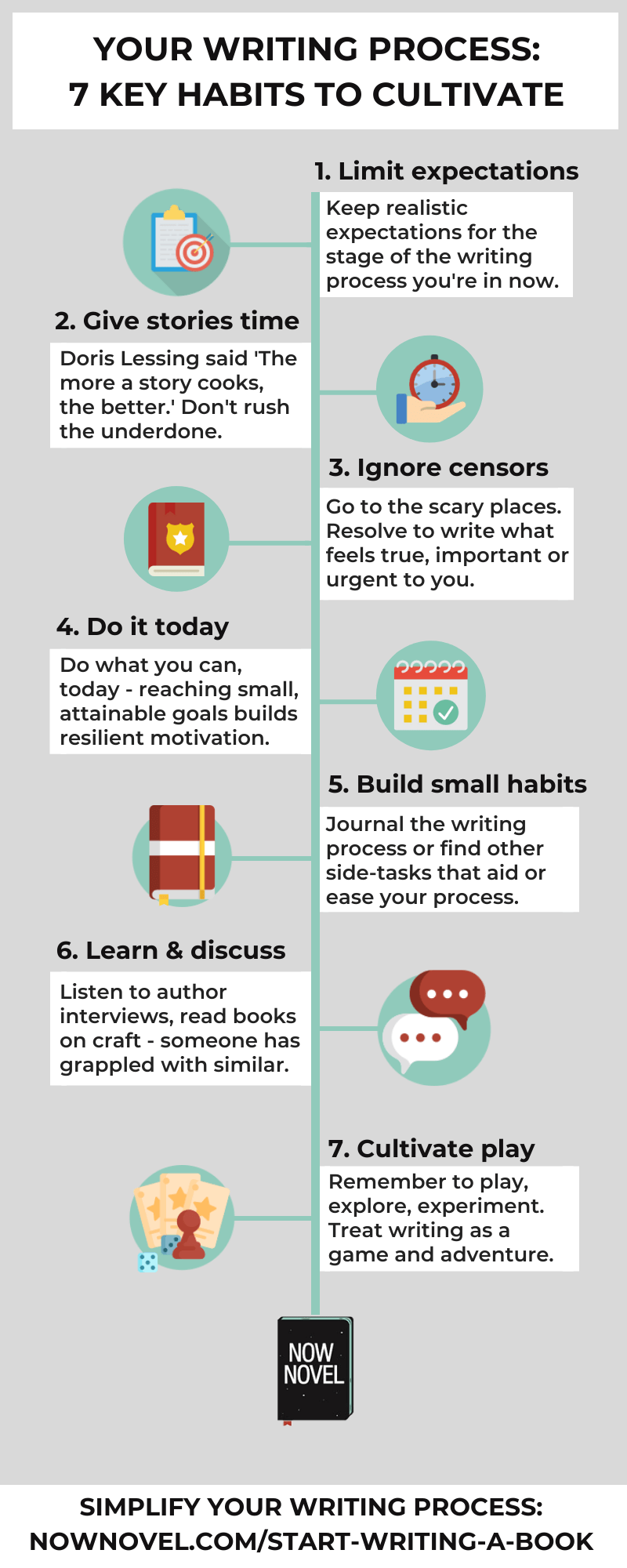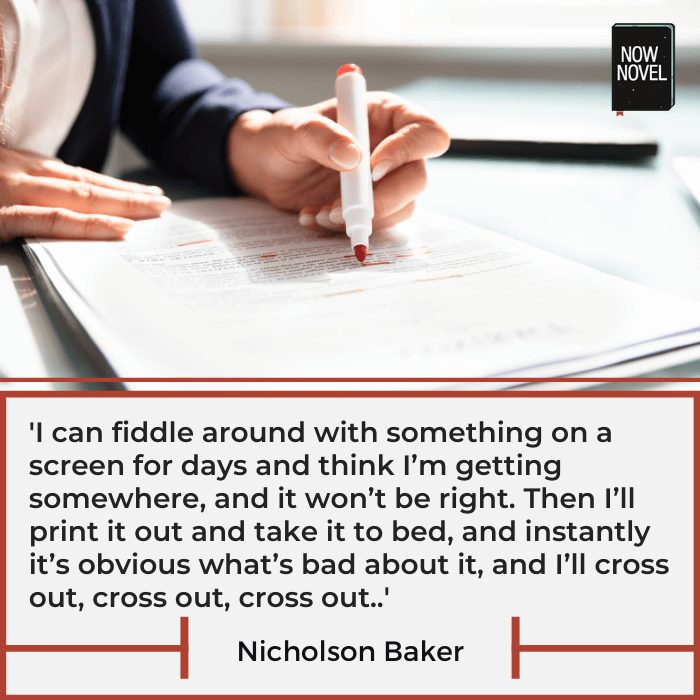The writing process is often spoken about in near-mystical terms. Sit in the right chair, at the right desk. Burn some sage. Turn around three times before you sit down to write. Yet anyone can build a successful writing process. Here are 7 key habits to reach your writing resolutions:
1. Keep realistic expectations of your writing process
As Purdue University’s online writing lab says, ‘writing can’t be done without going through certain stages’.
It’s difficult to make progress when we’re pressuring ourselves to be at stage 5 and we’re at stage 1. But what are the 5 stages of writing? Purdue’s OWL divides the typical writing process thus:
- Brainstorming: Finding ideas
The playful first phase in which we find and test ideas. By asking, for example, ‘what if?’ (‘What if a man woke up to find he’d transformed into a critter?’ for example, as in Kafka’s Metamorphosis) - Outlining: Building a story skeleton
Here, we begin to find shape, continuity, structure: How might Gregor Samsa (the salesman-become-critter in Kafka’s story) develop from this starting situation? In the outlining phase, we trace and plan possible developments. - Writing a rough draft: Hewing the rock of your story
Here, we imagine more detailed scenes and incidents, in or out of sequence. New characters arrive, places, people and situations change. We slave all day for 200 words’ progress. Or find we’ve written whole chapters in the blink of an eye. We make decisions such as ‘How will this story begin?’ and ‘How will it end?’ - Revising and editing: Refining and finding multiple facets
This phase is often described as toil and drudgery. It can be that. Yet revising and editing are creative processes too. Revisiting enables us to notice details, necessary tweaks and improvements we’re often blind to when in the thick of creation. - Polishing: Eliminating imperfections
A final polishing phase (such as proofreading for grammar mistakes) is crucial to make writing really shine. It allows the reader to focus on story, not text, because the text has been burnished and buffed. It helps to work with an editor for the last two phases – we’re often too close to our own texts to make neutral decisions in service to the story.
For each stage of the writing process, remember what your present purpose is. Remember to play without judging your ideas while brainstorming. When writing a rough draft, remember it is not the final work. Leave that clunky phrase for now – make a note to fix it later.
2. Give each stage of your writing process time
Doris Lessing once said ‘The more a story cooks, the better’, as Now Novel writing coach Romy Sommer shared in our webinar on the writing process:
Although we encourage writing marathons and sprints like NaNoWriMo (because they motivate us to keep writing, to write at all), constructing a good story ultimately takes time.
As you brainstorm, draw diagrams if it helps. Complete structured writing prompts using a simple tool like the Now Novel dashboard.
Cultivate the habit of setting aside adequate time for each task, with intention.
For example, set aside half an hour and say ‘I will brainstorm two story ideas’, or ‘I will outline my first chapter’.
Write down what you aim to achieve at the start of every writing session, at the top of the page. Getting stuck into each step in the writing process with intention keeps us clear-eyed and goal-focused.
3. Ignore your internal censor
Author E.M. Forster once wrote:
We are willing enough to praise freedom when she is safely tucked away in the past and cannot be a nuisance. In the present, amidst dangers whose outcome we cannot foresee, we get nervous about her, and admit censorship.
E.M. Forster, Two Cheers for Democracy, 1951.
In other words, it’s easy to write without inhibition when it feels safe. Know that your writing voice will develop the more you read and write.
We often censor ourselves when we stray into terrain that makes us afraid, of the judgment of others. Writing about family dynamics that draw on personal or traumatic experiences, for example. Or writing about subjects that may give offence.
As you brainstorm, outline or draft, remember to shut down any censoring voice that creeps into your writing process. Say what you want as imperfectly, boldly, or vulnerably, as you want. There’s personality and character where the truth is.

4. Achieve what you can, today
When we discussed writing resolutions for the new year in Now Novel’s writing groups, many members mentioned overcoming procrastination.
Because we coach writing beginners and experienced authors alike at Now Novel, we know that this is a challenge that besets the seasoned and the inexperienced alike.
Why do we procrastinate? Because it’s easier than confronting fears, insecurities or climbing the mountain when th peak looks so far away. A long-form project such as a novel may seem enormous and insurmountable. So break it down. Write a chapter in two-paragraph daily chunks, even, if it helps you to persist.
Motivation grows the more we align our goals to attainable, rewarding steps. Even small wins are motivators. And motivation is a powerful antidote to procrastination.
5. Build small habits that help you progress
Writers all have different methods for finding the focus, drive and determination to keep going.
Sue Monk Kidd describes keeping a journal when in the thick of a new project:
I sometimes start keeping a journal about the writing process itself. Particularly when I get the ideas, and I am trying to brood over the chaos phase. In writing a novel, you really have to brood over a lot of chaos of ideas and possibilities.
Sue Monk Kidd, Interview with Timshel Matheny for Paste Magazine, available here
Other writers like Michael Cunningham and Irvine Welsh have described creating playlists that help draw them into a character, a place, a time, a fictional world.
Hemingway allegedly would leave a line unfinished when he broke for the day, so that he had something easier to finish the next writing session.
Nicholson Baker has described the benefit of printing out a troublesome scene to see it with different eyes on the printed page:
I retyped the whole book. I was always a believer, even with word processing, that there’s something useful about having to retrace your steps from the beginning. And you have to print it out, too—you only get so far if you work by staring at a screen, because the resolution of the paper page is much higher. Your eye actually takes in things on paper more efficiently. I can fiddle around with something on a screen for days and think I’m getting somewhere, and it won’t be right. Then I’ll print it out and take it to bed, and instantly it’s obvious what’s bad about it, and I’ll cross out, cross out, cross out.
Nicholson Baker, interviewed by Sam Anderson in ‘The Art of Fiction No. 212’ in The Paris Review
These are all creative habits that may aid your own writing process.

6. Learn from discussions about writing
Writing groups and lectures, interviews, books on craft – all of these are useful avenues for finding solutions in your own work. Often, in author interviews, we’ll read an author say ‘X author said Y, and it got me thinking…’ Writing in a vacuum is hard. This is also why it’s helpful to work with a writing coach who has insight and experience to share. And read all you can – not just fiction itself, but about writing fiction.
For example, Googling ‘benefits of keeping a writing journal’ yields this article by Dolly Garland for Writing Cooperative, including helpful tips for ways to incorporate journaling into your process. Such as writing imaginary interviews with your characters to help understand and differentiate their personalities.
Resources such as The Paris Review and The Guardian and NPR are useful for interesting interviews and podcasts where other writers share valuable insights that aid our own storytelling.
7. Cultivate play and curiosity
Pressure kills play and creativity. Romance and inspiration are the domain of playfulness, of saying ‘what if’ and imagining.
Falling out of love with writing (or your story idea) is harder when you treat writing as a game (whether a purely intellectual game, or a game of empathetically imagining your characters, the way an actor does).
Make it a habit to ask, ‘What if I do this?’ For example, ‘What if I begin every word in this chapter with a vowel?’ Experiment, explore and play as you write and the writing process won’t grow weary too easily.
Get help developing your story, from capable peers or a dedicated, experienced writing coach.

